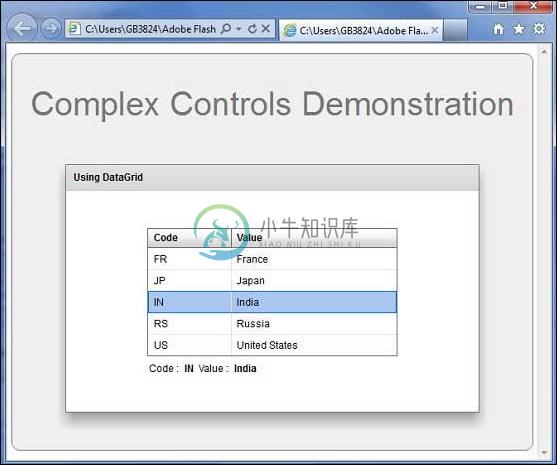DataGrid
介绍 (Introduction)
DataGrid控件在可滚动网格上方显示一行列标题。
Class 声明 (Class Declaration)
以下是spark.components.DataGrid类的声明 -
public class DataGrid
extends SkinnableContainerBase
implements IFocusManagerComponent, IIMESupport
公共属性 (Public Properties)
以下是DataGrid控件的公共属性。
| S.No | 财产和描述 |
|---|---|
| 1 | columnsLength : int [只读]如果指定了列IList,则返回columns.length的值,否则返回0。 |
| 2 | dataProvider : IList 与网格中的行对应的数据项列表。 |
| 3 | dataProviderLength : int [只读]如果指定了dataProvider IList,则返回dataProvider.length的值,否则返回0。 |
| 4 | dataTipField : String 数据提供程序中要显示为datatip的字段的名称。 |
| 5 | dataTipFunction : Function 指定要在数据提供程序的每个项目上运行的回调函数,以确定其数据提示。 |
| 6 | editable : Boolean GridColumn可编辑属性的默认值,指示是否可以编辑相应单元格的数据提供程序项目。 |
| 7 | editorColumnIndex : int [只读]正在编辑的单元格的从零开始的列索引。 |
| 8 | editorRowIndex : int [只读]正在编辑的单元格的从零开始的行索引。 |
| 9 | enableIME : Boolean [只读]一个标志,指示当组件获得焦点时是否应启用IME。 |
| 10 | imeMode : String GridColumn imeMode属性的默认值,它指定IME(输入法编辑器)模式。 |
| 11 | itemEditor : IFactory GridColumn itemEditor属性的默认值,它指定用于创建项目编辑器实例的IGridItemEditor类。 |
| 12 | itemEditorInstance : IGridItemEditor [只读]对项目编辑器的当前活动实例的引用(如果存在)。 |
| 13 | itemRenderer : IFactory 项目渲染器,用于未指定一个的列。 |
| 14 | preserveSelection : Boolean 如果为true,则在数据提供程序刷新其集合时保留选择。 |
| 15 | requestedColumnCount : int 此网格的测量宽度足以显示第一个requestedColumnCount列。 |
| 16 | requestedMaxRowCount : int 测量的网格高度足以显示不超过requestedMaxRowCount行。 |
| 17 | requestedMinColumnCount : int 此网格的测量宽度足以显示至少requestedMinColumnCount列。 |
| 18 | requestedMinRowCount : int 此网格的测量高度足以显示至少requestedMinRowCount行。 |
| 19 | requestedRowCount : int 此网格的测量高度足以显示第一个requestedRowCount行。 |
| 20 | requireSelection : Boolean 如果为true且selectionMode属性不是GridSelectionMode.NONE,则必须始终在网格中选择项。 |
| 21 | resizableColumns : Boolean 指示用户是否可以更改列的大小。 |
| 22 | rowHeight : Number 如果variableRowHeight为false,则此属性指定每行的实际高度(以像素为单位)。 |
| 23 | selectedCell : CellPosition 如果selectionMode是GridSelectionMode.SINGLE_CELL或GridSelectionMode.MULTIPLE_CELLS,则返回从第0行第0列开始的第一个选定单元格,并在移动到下一行之前逐行遍历每一列。 |
| 24 | selectedCells : Vector.《CellPosition》 如果selectionMode是GridSelectionMode.SINGLE_CELL或GridSelectionMode.MULTIPLE_CELLS,则返回一个CellPosition对象的Vector,表示网格中所选单元格的位置。 |
| 25 | selectedIndex : int 如果selectionMode是GridSelectionMode.SINGLE_ROW或GridSelectionMode.MULTIPLE_ROWS,则返回第一个选定行的rowIndex。 |
| 26 | selectedIndices : Vector.《int》 如果selectionMode是GridSelectionMode.SINGLE_ROW或GridSelectionMode.MULTIPLE_ROWS,则返回所选行索引的Vector。 |
| 27 | selectedItem : Object 如果selectionMode是GridSelectionMode.SINGLE_ROW或GridSelectionMode.MULTIPLE_ROWS,则返回当前选中的数据提供程序中的项目,如果未选择任何行,则返回未定义的项目。 |
| 28 | selectedItems : Vector.《Object》 如果selectionMode是GridSelectionMode.SINGLE_ROW或GridSelectionMode.MULTIPLE_ROWS,则返回当前选定的dataProvider项的Vector。 |
| 29 | selectionLength : int [只读]如果selectionMode是GridSelectionMode.SINGLE_ROW或GridSelectionMode.MULTIPLE_ROWS,则返回所选行的数量。 |
| 30 | selectionMode : String 控件的选择模式。 |
| 31 | showDataTips : Boolean 如果为true,则显示所有可见单元格的dataTip。 |
| 32 | sortableColumns : Boolean 指定用户是否可以以交互方式对列进行排序。 |
| 33 | typicalItem : Object 网格的布局确保宽度未指定的列足够宽,以显示此默认数据提供程序项的项呈示器。 |
| 34 | variableRowHeight : Boolean 如果为true,则每行的高度是到目前为止显示的单元格的首选高度的最大值。 |
| 35 | columns : IList 此网格显示的GridColumn对象列表。 |
公共方法 (Public Methods)
以下是DataGrid控件的公共属性。
| S.No | 方法和描述 |
|---|---|
| 1 | DataGrid() 构造函数。 |
| 2 | addSelectedCell(rowIndex:int, columnIndex:int):Boolean 如果selectionMode是GridSelectionMode.SINGLE_CELL或GridSelectionMode.MULTIPLE_CELLS,则将单元格添加到选择中并将插入符号位置设置为单元格。 |
| 3 | addSelectedIndex(rowIndex:int):Boolean 如果selectionMode是GridSelectionMode.MULTIPLE_ROWS,则将此行添加到选择中并将插入符号位置设置为此行。 |
| 4 | clearSelection():Boolean 如果selectionMode不是GridSelectionMode.NONE,则删除所有选定的行和单元格。 |
| 5 | endItemEditorSession(cancel:Boolean = false):Boolean 关闭当前活动的编辑器,并可选择通过调用项目编辑器的save()方法来保存编辑器的值。 |
| 6 | ensureCellIsVisible(rowIndex:int, columnIndex:int = -1):void 如有必要,请设置verticalScrollPosition和horizontalScrollPosition属性,以便指定的单元格完全可见。 |
| 7 | invalidateCell(rowIndex:int, columnIndex:int):void 如果指定的单元格可见,则会重新显示该单元格。 |
| 8 | invalidateTypicalItem():void |
| 9 | removeSelectedCell(rowIndex:int, columnIndex:int):Boolean 如果selectionMode是GridSelectionMode.SINGLE_CELL或GridSelectionMode.MULTIPLE_CELLS,则从选择中移除单元格并将插入符号位置设置为单元格。 |
| 10 | removeSelectedIndex(rowIndex:int):Boolean 如果selectionMode是GridSelectionMode.SINGLE_ROW或GridSelectionMode.MULTIPLE_ROWS,则从选择中删除此行并将插入符号位置设置为此行。 |
| 11 | selectAll():Boolean 如果selectionMode是GridSelectionMode.MULTIPLE_ROWS,则选择所有行并删除插入符号,或者如果selectionMode是GridSelectionMode.MULTIPLE_CELLS选择所有单元格并删除插入符号。 |
| 12 | selectCellRegion(rowIndex:int, columnIndex:int, rowCount:uint, columnCount:uint):Boolean 如果selectionMode是GridSelectionMode.MULTIPLE_CELLS,则将选择设置为单元格区域中的所有单元格,将插入符号位置设置为单元格区域中的最后一个单元格。 |
| 13 | selectIndices(rowIndex:int, rowCount:int):Boolean 如果selectionMode是GridSelectionMode.MULTIPLE_ROWS,则将选择设置为指定的行,将插入符号位置设置为endRowIndex。 |
| 14 | selectionContainsCell(rowIndex:int, columnIndex:int):Boolean 如果selectionMode是GridSelectionMode.SINGLE_CELL或GridSelectionMode.MULTIPLE_CELLS,则如果单元格在当前选择中,则返回true。 |
| 15 | selectionContainsCellRegion(rowIndex:int, columnIndex:int, rowCount:int, columnCount:int):Boolean 如果selectionMode是GridSelectionMode.MULTIPLE_CELLS,则如果单元格区域中的单元格位于当前选择中,则返回true。 |
| 16 | selectionContainsIndex(rowIndex:int):Boolean 如果selectionMode是GridSelectionMode.SINGLE_ROW或GridSelectionMode.MULTIPLE_ROWS,则如果index处的行在当前选择中,则返回true。 |
| 17 | selectionContainsIndices(rowIndices:Vector.《int》):Boolean 如果selectionMode是GridSelectionMode.MULTIPLE_ROWS,则如果索引中的行在当前选择中,则返回true。 |
| 18 | setSelectedCell(rowIndex:int, columnIndex:int):Boolean 如果selectionMode是GridSelectionMode.SINGLE_CELL或GridSelectionMode.MULTIPLE_CELLS,则将选择和插入位置设置为此单元格。 |
| 19 | setSelectedIndex(rowIndex:int):Boolean 如果selectionMode是GridSelectionMode.SINGLE_ROW或GridSelectionMode.MULTIPLE_ROWS,则将选择和插入位置设置为此行。 |
| 20 | sortByColumns(columnIndices:Vector.《int》, isInteractive:Boolean = false):Boolean 按一列或多列对DataGrid进行排序,然后刷新显示。 |
| 21 | startItemEditorSession(rowIndex:int, columnIndex:int):Boolean 在网格中的选定单元格上启动编辑器会话。 |
受保护的方法 (Protected Methods)
| S.No | 方法和描述 |
|---|---|
| 1 | commitCaretPosition(newCaretRowIndex:int, newCaretColumnIndex:int):void 更新网格的插入位置。 |
| 2 | commitInteractiveSelection(selectionEventKind:String, rowIndex:int, columnIndex:int, rowCount:int = 1, columnCount:int = 1):Boolean 响应于更改选择的用户输入(鼠标或键盘),此方法将调度selectionChanging事件。 |
事件 (Events)
| S.No | 活动和描述 |
|---|---|
| 1 | caretChange 当插入符号位置,大小或可见性因用户交互或以编程方式设置而发生更改时,由网格外观部件调度。 |
| 2 | gridClick 在单元格上单击鼠标时由网格外观部件调度。 |
| 3 | gridDoubleClick 在单元格上双击鼠标时由网格外观部件调度。 |
| 4 | gridItemEditorSessionCancel 关闭项目编辑器后调度而不保存其数据。 |
| 5 | gridItemEditorSessionSave 在项目编辑器中的数据保存到数据提供程序并且编辑器已关闭之后调度。 |
| 6 | gridItemEditorSessionStart 在打开项目编辑器后立即调度。 |
| 7 | gridItemEditorSessionStarting 在请求新项目编辑器会话时调度。 |
| 8 | gridMouseDown 在网格单元格上按下鼠标按钮时由网格外观部件调度。 |
| 9 | gridMouseDrag 如果鼠标在释放按钮之前移动,则在gridMouseDown事件之后由网格外观部件调度。 |
| 10 | gridMouseUp 释放鼠标按钮后,在gridMouseDown事件之后由网格外观部件调度,即使鼠标不再在网格内。 |
| 11 | gridRollOut 当鼠标离开网格单元格时由网格外观部件调度。 |
| 12 | gridRollOver 当鼠标进入网格单元格时由网格外观部件调度。 |
| 13 | selectionChange 选择更改后分派。 |
| 14 | selectionChanging 选择要更改时分派。 |
| 15 | sortChange 将排序应用于数据提供程序的集合后调度。 |
| 16 | sortChanging 在将排序应用于数据提供程序的集合之前调度。 |
方法继承 (Methods Inherited)
该类继承以下类中的方法 -
- spark.components.supportClasses.SkinnableContainerBase
- spark.components.supportClasses.SkinnableComponent
- mx.core.UIComponent
- mx.core.FlexSprite
- flash.display.Sprite
- flash.display.DisplayObjectContainer
- flash.display.InteractiveObject
- flash.display.DisplayObject
- flash.events.EventDispatcher
- Object
Flex DataGrid控件示例
让我们按照以下步骤通过创建测试应用程序来检查Flex应用程序中DataGrid控件的用法 -
| 步 | 描述 |
|---|---|
| 1 | 在cn.xnip.client包下创建一个名为HelloWorld的项目,如Flex - Create Application一章中所述。 |
| 2 | 修改HelloWorld.mxml ,如下所述。 保持其余文件不变。 |
| 3 | 编译并运行应用程序以确保业务逻辑按照要求运行。 |
以下是修改后的mxml文件src/cn.xnip/HelloWorld.mxml 。
<?xml version = "1.0" encoding = "utf-8"?>
<s:Application xmlns:fx = "http://ns.adobe.com/mxml/2009"
xmlns:s = "library://ns.adobe.com/flex/spark"
xmlns:mx = "library://ns.adobe.com/flex/mx"
width = "100%" height = "100%" minWidth = "500" minHeight = "500">
<fx:Style source = "/com/xnip/client/Style.css" />
<fx:Script>
<![CDATA[
import mx.collections.ArrayCollection;
[Bindable]
public var data:ArrayCollection = new ArrayCollection ([
{value:"France", code:"FR"},
{value:"Japan", code:"JP"},
{value:"India", code:"IN"},
{value:"Russia", code:"RS"},
{value:"United States", code:"US"}
]);
]]>
</fx:Script>
<s:BorderContainer width = "630" height = "480" id = "mainContainer"
styleName = "container">
<s:VGroup width = "100%" height = "100%" gap = "50"
horizontalAlign = "center" verticalAlign = "middle">
<s:Label id = "lblHeader" text = "Complex Controls Demonstration"
fontSize = "40" color = "0x777777" styleName = "heading" />
<s:Panel id = "dataGridPanel" title = "Using DataGrid"
width = "500" height = "300">
<s:layout>
<s:VerticalLayout gap = "10" verticalAlign = "middle"
horizontalAlign = "center" />
</s:layout>
<s:DataGrid dataProvider = "{data}" id = "dataGrid">
<s:columns>
<s:ArrayList>
<s:GridColumn dataField = "code" width = "100"
headerText = "Code" />
<s:GridColumn dataField = "value" width = "200"
headerText = "Value" />
</s:ArrayList>
</s:columns>
</s:DataGrid>
<s:HGroup width = "60%">
<s:Label text = "Code :" />
<s:Label text = "{dataGrid.selectedItem.code}" fontWeight = "bold" />
<s:Label text = "Value :" />
<s:Label text = "{dataGrid.selectedItem.value}" fontWeight = "bold" />
</s:HGroup>
</s:Panel>
</s:VGroup>
</s:BorderContainer>
</s:Application>
一旦准备好完成所有更改,让我们像在Flex - Create Application章节中那样在正常模式下编译和运行应用程序 。


